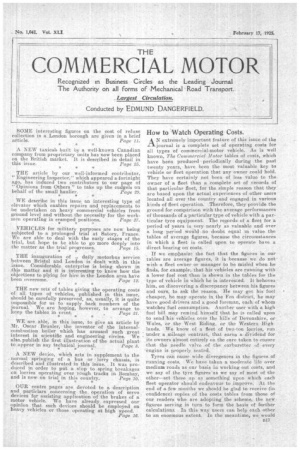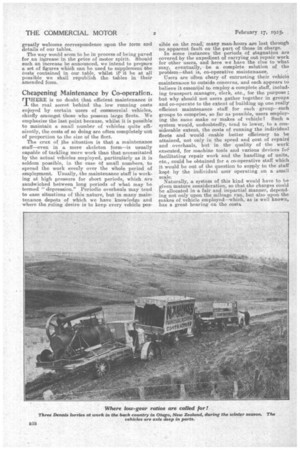How to Watch Operating Costs.
Page 1

Page 2

If you've noticed an error in this article please click here to report it so we can fix it.
-C1A N extremely important feature of this issue of the journal is a complete set of operating costs for all types of commercial-motor vehicle. As is well known, The Commercial Motor tables of costs, which have been produced periodically during the past twenty years, have been the most valuable key to vehicle or fleet operation that any owner could hold. They have certainly not been of less value to the owner of a fleet than a 'complete set of records of that particular fleet, for the simple reason that they are based upon the actual experiences of other users located all over the country and engaged in various kinds of fleet operation. .Therefore, they provide the ground for comparison with the average performances of thousands of a particular type of vehicle with a particular tyre equipment. The records of a fleet for a period of years is very nearly as valuable and over a long period would no doubt equal m value the tables of average figures, because the circumstances in which a fleet is called npon to operate have a direct bearing on costs.
. If we emphasize the fact that the figures in our tables are average figures, it is because we do not' wish a fleet owner or manager to be misled when he finds, for example. that his vehicles are running with a lower fuel cost than is shown in the tables for the type of vehicle in u hich he is interested. It behoves him, on discovering a discrepancy between his figures and ours, to ask the reason. He may get his fuel cheaper, he may operate in the Fen district, he may have good drivers and a good foreman, each of whom watches fuel consumption. Another user with a high fuel bill may remind himself that, he is called upon to send his vehicles over the hills of Devonshire, or Wales, or the West Riding, or the Western Highlands. We know of a fleet of two-ton lorries, run under a mileage contract, that earns a, dividend for its owners almost entirely on the care taken to ensure that the needle valve -of the carburetter of every --engine is properly seated.
Tyres can cause wide divergences in the figures of running costs. We have taken a moderate life over medium roads as our basis in working out costs, and we say of the tyre figures'as we say of most of the other—set these up as something upon which each fleet operator should endeavour to improve. 'At the end of a few months we should be glad to receive (in confidence) copies of the costs tables from those of our readers who are adopting the scheme, the new, figures serving in turn to form the basis of Vurther calculations. In this way users can help each other to an enormous extent. In the meantime, we would greatly welcome correspondence upon the form and details of our tables.
The way would seem to be in process of being paved for an increase in the price of motor spirit. Should such an increase be announced, we intend to prepare a set of figures which can be used to supplement the costs contained in our table, whilst if' it be at all possible we shall republish the tables in their amended form.
Cheapening Maintenance by Co-operation.
mHERE is no doubt that efficient maintenance is -Ithe real secret behind the low running costs enjoyed by certain users of commercial vehicles, chiefly amongst those who possess large fleets. We emphasize the last point because, whilst it is possible to maintain a small number of vehicles quite efficiently, the costs of so doing are often completely 'out of proportion to the size of the fleet.
The crux of the situation is that a maintenance staff—even in a mere skeleton form—is usually capable of tackling more work than that necessitated by the actual vehicles employed, particularly as it is seldom possible, in the case of small numbers, to spread the work evenly over the whole period of employment. Usually, the maintenance staff is working at high pressure for short periods, whieh are sandwiched between long periods of what may be termed "depression." Periodic overhauls may tend to ease situations of this nature, but in many maintenance depots of which we have knowledge and where the ruling desire is to keep every vehicle pos sible on the road; many man-hours are lost through no apparent fault on the part of those in charge. In some instances the periods of stagnation are covered by the expedient of carrying out repair work for other users, and here we have the clue to what may, eventually, be a, complete solution of the problem—that is, co-operative maintenance. Users are often chary of entrusting their vehicli. anaintenaoce to outside concerns, and each appears to believe it essential to employ a complete staff, including transport manager, clerk, etc., for the purpose ; but why should not users gather together in groups and co-operate to the extent of building up one really efficient maintenance staff for each group—such groups to comprise, so far as possible, users employing the same make or makes of vehicle? Such a system would, undoubtedly, tend to lower, to a considenable extent, the costa of running the individual fleets and would enable better efficiency to be attained, not only in the speed and cost of repaint and overhauls, but in the quality of the work executed, for machine tools and various devices lei facilitating repair work and the handling of units, etc., could be obta,ined for a co-operative staff which it would be out of the question to supply to the staff kept by the individual user operating on. a small scale. — Naturally, a system of this kind would have to he given mature consideration, so that the charges could be allocated in a fair and impartial manner, depending not only upon the mileage run, but also upou the makes of vehicle employed—which, as is well known, has a great bearing on the costs
































